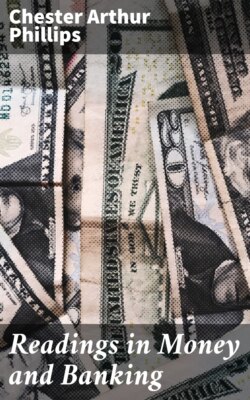Читать книгу Readings in Money and Banking - Chester Arthur Phillips - Страница 57
На сайте Литреса книга снята с продажи.
Should the Greenbacks Be Retired?
ОглавлениеTable of Contents
[13]Let us now consider for a moment an issue which twenty years ago was urgently pertinent, was in fact the very crux of so-called "currency reform," and which still persists as a live issue in the minds of some of the veteran "reformers" of those days, although the conditions which then gave it point have long since disappeared.
In the middle nineties, when it was estimated that the total gold stock of the entire country was only about 600 million dollars and less than 200 millions of this was in the vaults of the treasury, the Government's fiduciary currency, consisting of 346 millions of greenbacks and 400 millions or more of overvalued silver, presented beyond question a serious menace to the country's monetary standard. It meant that the treasury had outstanding currency obligations payable in gold to the extent of three or four times its own gold holdings, and amounting to far more than all of the gold in the country, including the holdings of the treasury, the banks, and the general public. At that time fluctuations in the trade balance of a single year sometimes almost equalled the treasury's gold holdings in amount, and it was quite conceivable, in fact not improbable, that a sudden unfavorable change in that balance might drain the treasury of all of its gold, and leave the country with a currency standard of depreciated silver or paper. This was the situation which continually menaced Mr. Cleveland's second administration, causing great financial anxiety and forcing the treasury during those years of peace and normal expenditures to borrow 262 million dollars in gold in order to replenish its continually dwindling reserve. Such a situation inevitably led the advocates of monetary legislation in the nineties to place first and foremost among their proposals the necessity of getting rid of the precarious greenback, and most of the plans proposed by bankers' associations, chambers of commerce, and financial experts generally at that time emphasized the urgency of this measure.
